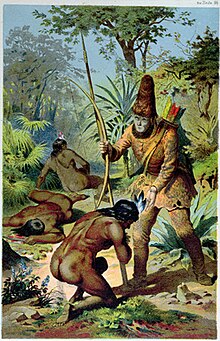Friday (Robinson Crusoe)
This article needs additional citations for verification. (August 2015) |
- Man Friday and variations thereof redirect here. For the 1975 film, see Man Friday (1975 film). For the 2014 film, see Man Friday (2014 film).

Friday is one of the main characters of Daniel Defoe's 1719 novel Robinson Crusoe. Robinson Crusoe names the man, with whom he cannot at first communicate, Friday because they first meet on that day. The character is the source of the expression "Man Friday", used to describe a male personal assistant or servant, especially one who is particularly competent or loyal. Current usage also includes "Girl Friday".
Character
Robinson Crusoe spends twenty-eight years on an island off the coast of Venezuela with his talking parrot Poll, his pet dog, and a tame goat as his only companions. In his twenty-fourth year, he discovers that Carib cannibals occasionally use a desolate beach on the island to kill and eat their captives.[a]
Crusoe observes one of the Caribs, kept captive and about to be eaten, escape his captors. Crusoe ambushes two pursuers, and the others leave in their canoes without knowing what happened to their companions. The escaped captive bows in gratitude to Crusoe, who decides to employ him as a servant. He names him Friday after the weekday upon which the rescue takes place.
Crusoe describes Friday as being a Native American, though very unlike the Indians of Brazil and Virginia. His religion involves the worship of a mountain god named Benamuckee, officiated over by high priests called Oowokakee. Crusoe learned a few of his native words that have been found in a Spanish-Térraba (or Teribe) dictionary, so Friday may have belonged to that tribe, also called the Naso people. Friday tolerates cannibalism, and even suggests eating the men Crusoe has killed.
Crusoe teaches Friday the English language and converts him to Christianity. He tells him that cannibalism is wrong. Friday accompanies him in an ambush in which they save Friday's father.
Crusoe returns to England twenty-eight years after being shipwrecked on the island, and four years after rescuing Friday. Friday's father goes with a Spanish castaway to the mainland to retrieve fourteen other Spanish castaways, but Crusoe and Friday depart the island before they return.
Friday accompanies Crusoe home to England, and is his companion in the sequel The Farther Adventures of Robinson Crusoe, in which Friday is killed in a sea battle. In Jules Verne's L'École des Robinsons (1882), the castaways rescue an African Negro on their island who says his name is Carefinotu. T. Artelett proposes to call him Mercredi ("Wednesday"), "as it is always done in the islands with Robinsons,"[1] but his master Godfrey prefers to keep the original name.
Film and television adaptations
- The 1935 Mickey Mouse cartoon Mickey's Man Friday features Mickey as Crusoe, with Friday and other islanders as humanized monkey characters.
- The 1935 Oswald the Lucky Rabbit cartoon Robinson Crusoe Isle features Oswald applying for a job as Robinson Crusoe's "man Friday." Crusoe's twelve previous Fridays have been eaten by cannibals, making Oswald "Friday the 13th."
- In Luis Buñuel's 1954 film Robinson Crusoe, Jaime Fernández played Friday alongside Dan O'Herlihy as Crusoe.
- In the 1990s animated series Robinson Sucroe, a parody of Robinson Crusoe, the island Sucroe lands on is heavily populated by friendly natives, all of whom are named after days of the week and times of day (e.g. "Tuesday Dawn") as a reference to Friday.
- The 1964 film Robinson Crusoe on Mars recasts the Robinson Crusoe story as a space adventure. Victor Lundin played the rescued companion of Crusoe figure Commander Christopher Draper (Paul Mantee), who dubs him "Friday" in reference to the novel.
- Man Friday, a 1975 British film, retold the story from Man Friday's point of view. It starred Richard Roundtree as Man Friday and Peter O'Toole as Crusoe.
- In the 1981 French TV movie fr, Friday was played by Gene Anthony Ray.
- In the 1997 film version of Robinson Crusoe, William Takaku played Friday to Pierce Brosnan's Crusoe.[2]
- In the 2008 American TV series Crusoe, Friday was played by Tongayi Chirisa.
- In the 2010 series Terriers, Hank jokingly refers to Britt as his "Man Friday."
- In the 2015 film Avengers: Age of Ultron, Tony Stark installs a digital personal assistant with a female Irish voice named F.R.I.D.A.Y. as the operating system of his Iron Man armor.
Idiom
The term Man Friday has become an idiom, still in mainstream usage[citation needed], to describe an especially faithful servant or one's best servant or right-hand man. The female equivalent is Girl Friday. The title of the movie His Girl Friday alludes to it and may have popularised it.
Notes
- ^ The portrayal of Caribs as cannibals is still controversial; as recently as 2006, complaints were made about the portrayal of Caribs in the movie Pirates of the Caribbean: Dead Man's Chest.
